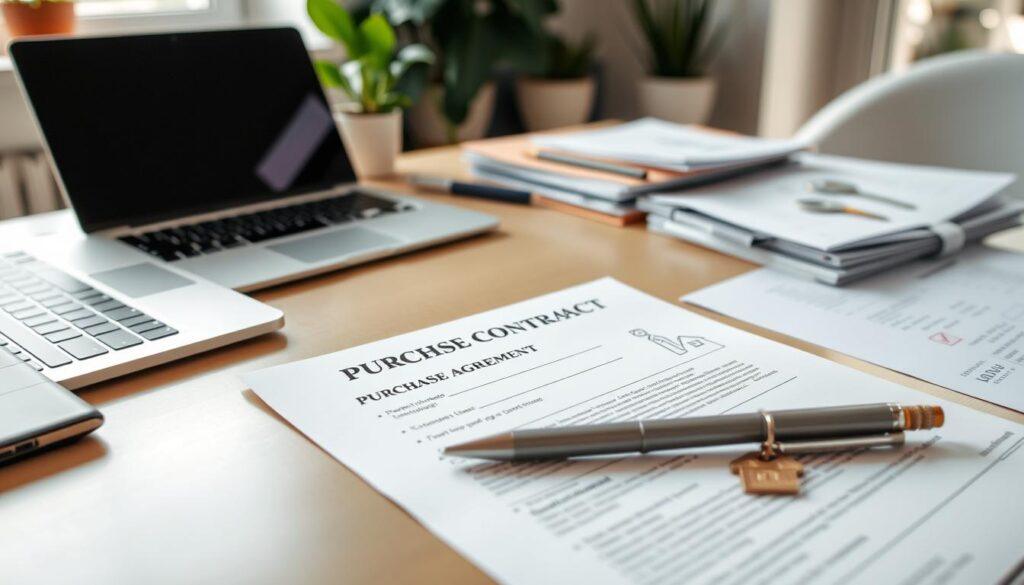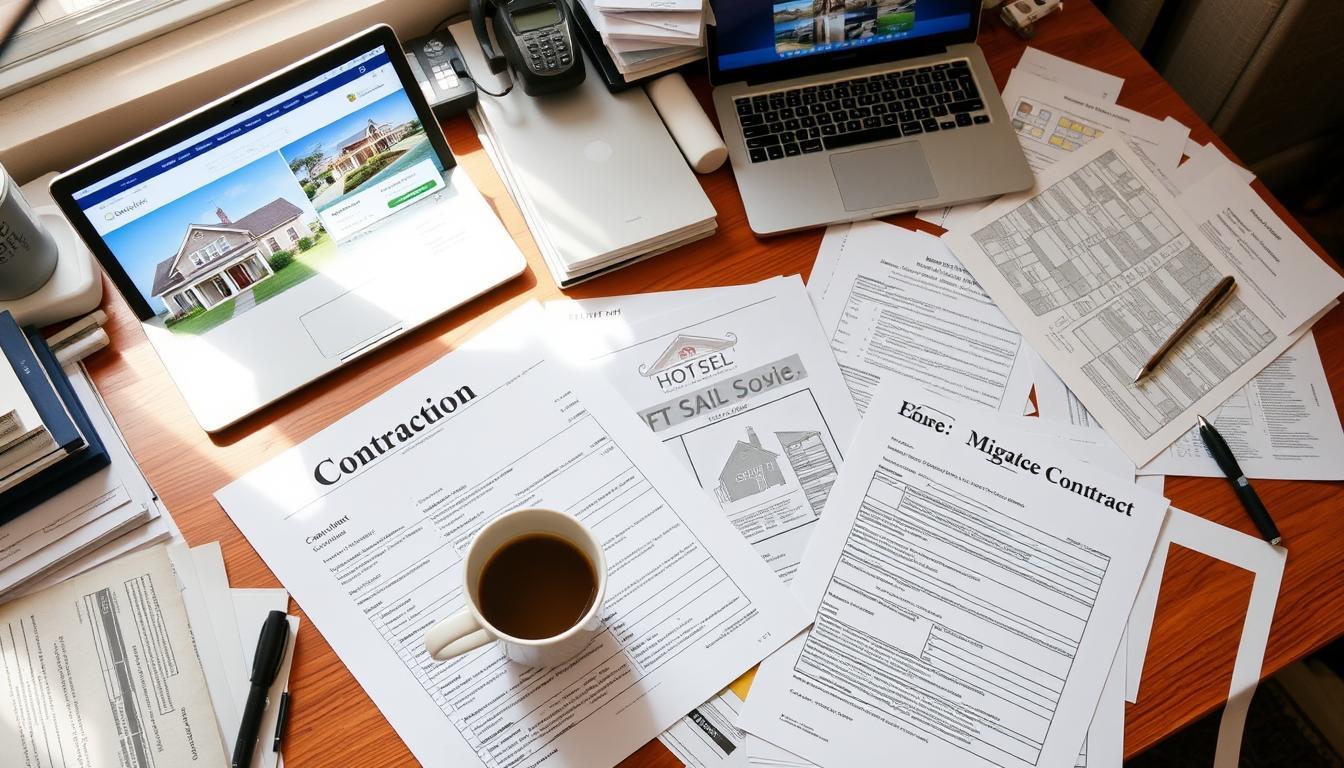Ever thought about selling your home without a realtor? Many homeowners want to save on commission fees. But, the paperwork can be tricky and lead to big mistakes if not done right.
This guide will help you understand the complex world of FSBO paperwork. You’ll learn about the important documents, how to avoid legal problems, and how to prepare quickly for your sale.
Key Takeaways
- Understanding FSBO paperwork is crucial for a successful sale.
- Proper documentation can save sellers thousands on realtor commissions.
- Legal issues may arise from incomplete or incorrect DIY home selling legal documents.
- Preparation is the key to a smooth transaction without a real estate agent.
- Home improvements and repairs can significantly affect sale prices.
- Awareness of state-specific seller disclosures is vital.
The Importance of Paperwork When Selling a Home
When selling a house, paperwork is key, not just a formality. It’s what makes a sale go smoothly. It makes sure everyone knows their part and keeps legal troubles away. Knowing about seller’s disclosure, purchase agreements, and title documents is crucial.
Understanding Key Documentation
When you sell a house privately, paperwork is the main focus. Here are some important documents to know:
- Seller’s Disclosure Statement: This document is required in most states. It lists any major problems or dangers with the property.
- Purchase Agreement: This contract is binding. It outlines the sale’s terms between the buyer and seller.
- Title Report: It shows who owns the property and any restrictions or debts on it.
- Property Appraisal: The buyer usually orders this. It costs $300 – $500 but is vital for negotiations.
Home sellers also need to prepare selling a house without an agent forms. This includes recent utility bills, property tax records, and homeowners insurance proof. Having these ready can help keep offers from falling through.
Avoiding Legal Issues
Paperwork is more than just filling out forms; it protects against big legal problems. Sellers must tell buyers about any known issues, like foundation problems or pests. They might also need to show proof of improvements to lower taxes. Each state has its own rules, so knowing them is important.
Closing costs can vary a lot, depending on where you are. They might include a deed transfer tax or fees for preparing documents. Almost all parts of the selling process, including these costs, can be talked about when selling a house privately paperwork is ready. Also, a real estate attorney might be needed to make sure all legal papers are done right, adding more complexity to the deal.
Why Do Some Sellers Avoid Working With a Realtor?
Many homeowners want to sell their properties without a realtor for financial and personal reasons. They aim to save on commission fees, which can be a big chunk of the selling price. By using selling a house without a realtor forms, they try to keep more of their profit.
Cost Savings
Cost savings is a big reason for avoiding realtors. Realtor fees can be 5% to 6% of the sale price, which is thousands of dollars. Homeowners who sell by owner use a selling a house by owner contract to save even more. This way, they can keep more of their home’s sale price for other investments.
Desire for Control
Some homeowners want to control the selling process. By selling without a realtor, they can choose how to market their home and set their own timeline. They also handle negotiations with buyers themselves. This approach can make the sale more satisfying, but it means they must handle all the paperwork and legal details.
The Most Common Paperwork For Selling A House By Owner
When you decide to sell your house on your own, knowing the paperwork is key. Each document has its own role, making sure the sale goes smoothly and follows the law. Focusing on the must-have documents helps sellers get through this step by step.
Mandatory Disclosure Documents
Mandatory disclosure documents are very important. They tell buyers about any problems with the property. Here are some key ones:
- Lead-Based Paint Disclosure: For homes built before 1978, this warns buyers about lead hazards.
- Residential Sales Disclosure Forms: These forms tell about the property’s condition and any flaws.
- Water Quality Test Results: Some places require this test before a sale.
- Documentation of Any Pending Litigation: Sellers must tell buyers about any legal issues with the property.
- Trust Documents: These are crucial if the home is in a trust, showing how it can be sold.
Sale Contracts
A detailed sale contract is vital when selling by yourself. It outlines the deal’s terms, like:
- Sale Price: The agreed price between buyer and seller.
- Contingencies: Conditions that must be met for the sale to happen.
- Earnest Money Deposit Agreement: Shows the buyer’s commitment to the deal.
- Closing Statement: Lists all fees and costs of the sale.
- Deed Types: Different deed forms, like warranty or quitclaim deeds, ensure the property is transferred correctly.
Knowing about these key FSBO documents helps sellers feel confident. Keeping detailed records not only protects the seller but also gives peace of mind during the sale.
How to Sell a House By Owner Paperwork
When you sell your house yourself, getting the right paperwork is key. Knowing what forms you need helps you follow the law and makes the sale smoother. It also builds trust with buyers and makes the whole process better.
Essential Forms and Documents Needed
To sell your property well, you need to gather a few important documents:
- Original sales contract
- Property survey
- Mortgage statement and other loan documents
- Latest utility and property tax bills
- Certificate of occupancy
- Title deed
- Home warranties
- Homeowners association agreements
These legal documents are crucial for selling your house. For instance, the original sales contract outlines the deal’s terms. Also, showing your mortgage statement helps buyers understand your loan situation, making things clearer.
Tips for Gathering Necessary Information
To make gathering documents easier, stay organized and proactive. Here are some tips:
- Make a detailed checklist of all needed documents.
- Keep your papers in a binder or digital folder for easy reach.
- Document any home improvements or upkeep that might interest buyers.
- Do a market analysis to know your property’s worth.
Focus on the original purchase, how you’ve used the house, and any upgrades before you list. This helps avoid delays and gives buyers valuable information.

Understanding Residential Property Disclosure Form
A Residential Property Disclosure Form is key when selling a house on your own. It gives buyers important details about the property’s state. Sellers must reveal any known problems like structural issues, water damage, or pests. Knowing what to disclose and following state rules is vital for trust and transparency.
What Needs to Be Disclosed?
Many things need to be disclosed, including:
- Hazardous substances like toxic waste and lead-based paint
- Active pests like termites
- Previous repairs that affect the structure
- Neighborhood problems like noise or smells
- Flooding history, foundation cracks, and water damage
- Liens or disputes that affect ownership
These documents make sure buyers know everything about the property before they buy.
State-Specific Requirements
Every state has its own rules for disclosure. For example:
- In Texas, certain deaths must be disclosed, especially if they’re related to property issues or violent crimes.
- New York lets sellers skip some disclosures by giving buyers a $500 credit.
- North Carolina requires sellers to disclose external problems like smoke or noise.
- California asks sellers to disclose seismic hazards and deaths in the last three years.
Knowing these rules helps sellers follow the law and protect everyone involved in the sale.
Preparing the Purchase Agreement
The purchase agreement is key in the real estate deal. It lists all the terms for selling the property. Sellers, especially those without a realtor, need to understand it well. Knowing the details can make the sale smoother and more successful.
Key Components of the Agreement
A good purchase agreement has several important parts:
- Sale Price: The total amount the buyer will pay.
- Earnest Money Deposit: A deposit showing the buyer’s commitment.
- Contingencies: Conditions like financing approval or property inspections.
- Closing Date: The date when the sale will be finalized.
Also, include disclosures about risks like natural disasters or toxic materials. Make sure to follow state rules on these. Sellers should talk about these risks early on, especially in a for-sale-by-owner deal.
Negotiation Tips
Be ready to negotiate different parts of the agreement. Here are some tips:
- Stay Flexible: Be willing to change some terms to make your offer better.
- Know Your Bottom Line: Know the lowest terms and price you’ll accept.
- Communicate Effectively: Talk openly to build trust and understanding.
- Document Changes: Make sure any changes are written down in the agreement.
Using these negotiation tips can make your offer more appealing. This can lead to a successful sale.

Additional Documents Required for Closing
When selling a property, you need to gather many important documents. These papers help make the sale smooth and legal. They include title reports, loan documents, and bills for utilities and property taxes.
Title Reports and Deed
A title report checks if the seller can sell the property. It also finds any debts or issues with the property. The deed, meanwhile, proves the buyer owns the property after the sale.
Loan Documents and Financial Statements
If you have a loan on the property, you’ll need to close it out. This includes statements showing how much you owe. Sellers should also give up-to-date financial statements to be clear about the sale.
Utility and Property Tax Bills
Recent bills for utilities and property taxes are key at closing. Sellers must show they’ve paid these bills. This makes sure the buyer won’t face any surprises.
| Document | Purpose |
|---|---|
| Title Report | Verifies the seller’s right to transfer ownership and identifies liens |
| Deed | Official document confirming buyer’s ownership |
| Loan Documents | Details existing loans, including payoff statements |
| Utility Bills | Proves all utilities are paid and operational before transfer |
| Property Tax Bills | Ensures no outstanding taxes on the property |
Conclusion
Understanding how to sell a house by owner paperwork is key for FSBO sellers. It’s important to know the different forms and documents. This includes everything from initial disclosures to closing paperwork.
Each document has its own role. They help make the selling process clear and open. This way, both the seller’s rights are protected and the sale goes smoothly.
Getting ready and staying organized is crucial for a successful sale. Sellers need to spend around 40 to 70 hours on paperwork. This effort helps avoid problems and makes the process easier.
By doing this, sellers can save money on realtor fees. They can avoid paying 5% to 7% in commissions. This way, they can keep more of the sale’s profit for themselves.
Choosing to handle FSBO paperwork gives sellers more control over their sale. They can use tools like home valuations for better clarity. In today’s competitive market, being thorough and detailed is essential for a good selling experience.






